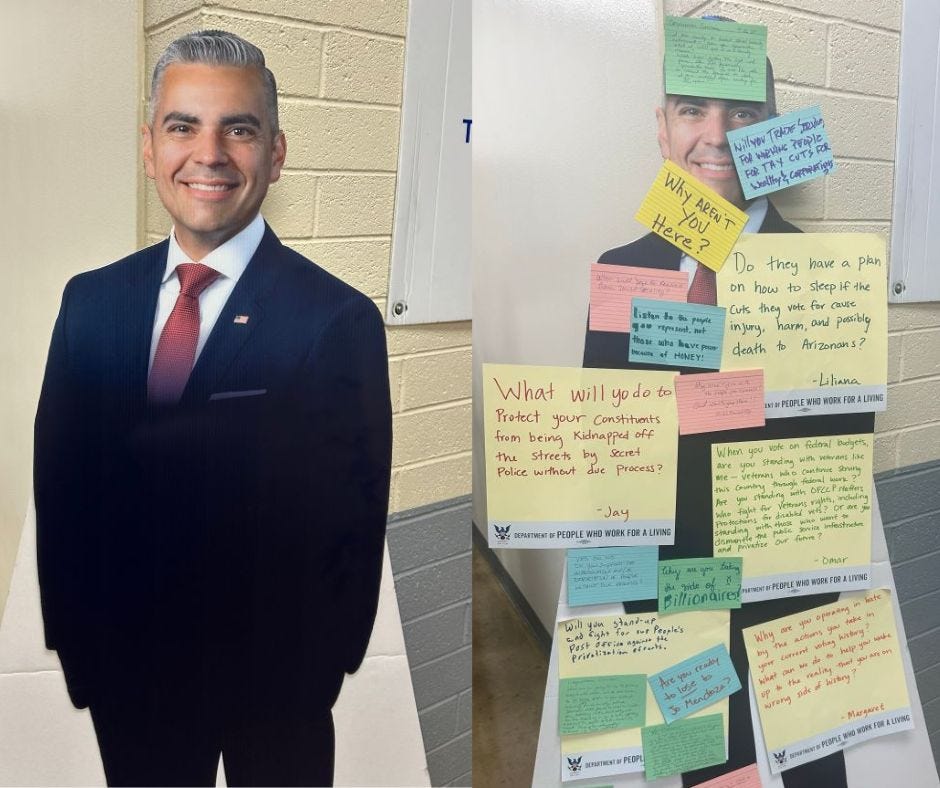A county icon retires
New clerk takes over … Another "town hall" … And everyone is using lists.
Gary Harrison almost ended his career with Pima County in 2018, choosing to retire rather than work in a broken system.
Instead, his co-workers convinced him to run for office to fix what was broken, and he wound up becoming Pima County’s first Black elected official as the Clerk of the Superior Court.
So how did a kid from Ypsilanti, Michigan, find his way to Tucson in the first place? After his abrupt retirement earlier this month, Harrison sat down with the Tucson Agenda to talk about his years of service with Pima County and to learn more about the challenges he faced as the Clerk of the Superior Court.
Harrison might be better known in some circles for his time as a University of Arizona Wildcat basketball player, a guard on the team that went to the Elite Eight in 1976 when Fred Snowden was coaching.
”We probably had the best team in the country. And I know I'm biased, we had (former Head coach at the University of Texas) Don Haskins sending your players letters that if you are unhappy, you can come play with (them),” Harrison said, noting the attempt to steal him away was the highest compliment as a player.
He stayed all four years, playing under the first Black head coach in NCAA Division 1 basketball history.
After college, he went back to Michigan, working for a decade as an electric lineman before saving enough money to move his wife and two kids to Tucson.
The money didn’t last as long as he had hoped, so he turned to former Tucson Mayor Jim Corbett — who had been subsequently elected as the Clerk of the Pima County Superior Court — for a job.
“I thought I was gonna be in the clerk's office four or five months, get some insurance and that kind of thing. One thing led to another. I applied for him for a bigger position, got it, you know, assistant supervisor, and not long after that, a supervisor. So I've had every job in the clerk's office,” Harrison said.
His entry into politics was colored by the creeping cynicism of working in the office after two decades, but it was love for his colleagues that got him to run for office in 2017.
“I started being cynical. And I walked in one day and I said, you know what? This is wrong, and I'm not gonna change, so I'm gonna be done. So I quit,” Harrison said.
It wasn’t long after he announced his retirement that his colleagues asked him to challenge the elected clerk, Republican Toni Hellon. Harrison agreed, turning his retirement into the full-time job of running for public office.
“So I retired in January. By the Martin Luther King Holiday, I was running,” he said.
He beat his former boss in November 2018, becoming the first Black elected official in Pima County.
During the pandemic, Harrison came to work every day, keeping the office open and operating, despite a swiftly changing environment as the court pivoted to a digital-friendly system.
He said he learned a strong work ethic from his father, who worked as a cement finisher even right after he broke his arm.
”The rule is in this family, if your arm isn't broke, you better take your ass at work. That's what it is,” he said. “During the pandemic. I never missed a day, right? Two years. I never missed one day.”
In his last few years, Harrison said he focused on improving the clerk's office, successfully modernizing highly specialized court software systems. After winning a second term in 2022, Harrison resigned this month. Harrison said he would like to see more transparency in court operations from the county as software continues to evolve.
“Long story short, there's not enough accountability in that building,” he said.
Gov. Katie Hobbs appointed the new clerk of the Superior Court, James Giacomino, in April. He’ll fill out the remainder of Harrison’s term until the 2026 election.
We are always talking to someone for the next article. Help us continue those conversations by upgrading today!
Stuffed somewhere in Congressional District 6, presumably in a union hall closet, is a life-sized cardboard cutout of Rep. Juan Ciscomani.
The new, upgraded prop replaces the empty chair activists used at a mock town hall for the two-term Republican a month ago, part of a national strategy to hold in-person events in GOP districts where congress members aren’t meeting their constituents.
Union labor groups behind the hour-long event called it a meeting of the "Department of People Who Work for a Living" — a clear slam against the Trump administration’s DOGE initiative.

Cut-out of Congressman Juan Ciscomani used at the town hall — before the event started (left) and after it ended (right).The partisan event focused clearly on union priorities, including continued cuts to federal jobs, executive orders targeting collective bargaining rights and the impact that cuts in Medicaid would have in the community.
Fred Yamashita, the executive director of the Arizona AFL-CIO, told the crowd that these town halls are being held as union workers aren't being heard by many in the Arizona Congressional delegation — including Ciscomani.
“If they won’t listen, we will make our voices louder,” Yamashita told the audience.
It’s unclear whether these events will move the needle on getting Ciscomani to hold an in-person town hall. He did, however, meet with business leaders at the swanky Arizona Biltmore in Phoenix last week.
In recent weeks, Ciscomani held a telephone town hall with reportedly 4,000 residents and he’d indicated he was planning on doing more.
We hear that local activists are undeterred and will continue to regularly hold town hall events — with or without Ciscomani.
Bowing out: After a spat with several members of the Pima Association of Governments board, PAG attorney Thomas Benavidez resigned last week, the Arizona Daily Star’s Charles Borla reports. Benavidez wrote in his resignation letter that the board deserves an attorney it can trust and “clearly, that person is not me.” The tension rose in recent weeks as the PAG and Regional Transportation Authority boards tried to hammer out a massive transportation deal they could send to voters this fall.
Fickle funders: A Tucson nonprofit is taking a financial hit after the Trump administration clawed back a $350,000 grant, the Tucson Sentinel’s Paul Ingram reported. Archaeology Southwest was using the grant from the National Endowment for the Humanities to create a digital Indigenous field guide of Sonoran Desert plant and animal species. Meanwhile, University of Arizona researchers are crying foul after the National Institutes of Health said anyone who wants a grant must disavow DEI and disinvestment from Israel, the Star’s Prerana Sannappanavar reports.
Disturbing reflection: The fatal attack of a man who was just passing through Tucson put a spotlight on violence in the city, Star columnist Tim Steller writes. Jacob Couch and his wife reportedly were sitting on a bench at a streetcar stop when they were attacked by a hatchet-wielding man with a history of minor crimes and mental health problems.
“It said something about Tucson that Tucson doesn’t like to say about itself: That this funky city in a beautiful natural setting can be a dangerous place where sudden violence may break out anywhere or time,” Steller writes.
Getting out of hand: A plan to move Borderlands Brewery out of its location in downtown Tucson led to death threats to officials on the Rio Nuevo board, KOLD’s Raya Torres reported. Borderlands has been around since 2001, but it was on a month-to-month lease and a comedy club is taking over the location. When the Rio Nuevo board supported replacing Borderlands with the comedy club, the board started getting threats, which spurred them to send some employees home early.
Take a stroll: You probably already knew that Tucson had a lot of beautiful public murals. But have you seen them all in one place? The team at This is Tucson put together a long list of the abundant murals in Tucson, which they keep updated as local artists add to the tally.
Protest pushback: The Arizona Senate approved a bill that would block protesters from setting up encampments on college campuses, KJZZ’s Greg Hahne reported. The bill was spurred by pro-Palestine protesters who set up camp on the campuses of the University of Arizona and Arizona State University last year. Tucson Democratic Rep. Alma Hernandez sponsored the bill, saying the encampments were breeding grounds for antisemitism. Opponents of the bill are pointing to First Amendment challenges that are likely to come. Meanwhile, a vandal put graffiti reading “End Apartheid Abolish Israel” on the side of the Chabad-Tucson Young Israel Congregation in Tucson last week, KVOA’s Chorus Nylander reported.
New chamber incoming: The Tucson Metro Chamber and Sun Corridor Inc. are merging to form the Chamber of Southern Arizona, the Star’s Gabriela Rico reports. Sun Corridor helps recruit big businesses to come to Tucson, while the Metro Chamber focuses mostly on small businesses.
Thanks to our friends at OUTLOOK — Arizona’s best LGBTQ+ news source — for inviting Joe to join their “office hours” with community members in Tucson this weekend.
We had a good discussion about local politics, municipal budgeting and how nonprofit funding works here in the Old Pueblo with LOOKOUT editor Joseph Darius Jaafari and the CEO of the Community Foundation of Southern Arizona, Jenny Flynn.
The group spent about 90 minutes getting into the weeds of how your tax dollars are spent with members of the community who showed up for the event in person and online.
As we suspected, it seems like everyone is sharing their fundraising lists in the Democratic primary for the Congressional District 7 special election.
Last week, we mentioned that former Pima County Supervisor Adelita Grijalva has been using her late father’s email list.
But she’s not alone. Democratic state Rep. Alma Hernandez has been helping her brother, Daniel Hernandez, with his latest run for Congress by using her listserv to email supporters about an upcoming event for her brother’s campaign.
Daniel confirmed to the Tucson Agenda over the weekend that he is getting support from his politically connected sisters.
“I’m proud to have the support of my sisters in this campaign,” he said.
As we noted on Friday, sharing fundraising lists is extremely common, whether given freely or sold as data to any campaign with deep enough pockets.
This practice isn’t illegal and will be reported in their next Federal Election Commission report. However, the way campaign finance laws are set up, voters won't hear about any of this until way after they've mailed in their ballots.











At a protest in front of Ciscomani's office, CJ Karamargin, an advisor to Ciscomani, told me that Ciscomani will never hold a town hall. He asked me, (paraphrased) Do you follow the news? Do you see how congressmen are screamed at? It's just not productive.
Personally, I think that if a 91 yr old Chuck Grassley can face people screaming at him, Ciscomani could too.
BTW, 74% of Ciscomani's constituents live in Tucson.
Thx for showing the beautiful mural by Jessica Gonzales at The Loft! And I am glad you highlighted This is Tucson for their long list of murals in Tucson. In 2022, I used that list when I decided to have a mural painted at my home. It was a terrific way to discover the many muralists in our community Eventually, I selected Keegan Ryder because his presentation was exactly what I had in mind. His mural is now my most prized artistic possession.